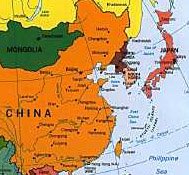ARENAS MOVEDIZAS EN ASIA

El anuncio de Corea del Norte de realizar un test nuclear pone de manifiesto las difíciles relaciones entre China, Japón y las dos Coreas. El acercamiento de Corea del Sur a China y la llegada al poder en Japón de un primer ministro "belicista" puede empeorar unas relaciones que todavía no han olvidado las guerras del siglo XX en Asia. A todo esto se une el conflicto de Taiwan (con el apoyo de EE.UU. y Japón), una posible escalada nuclear en toda Asia (sobre todo si Japón decide dotarse de un ejército moderno) y otros conflictos territoriales donde hay importantes recursos petrolíferos. En fin, que el norte de Asia, donde casi se tocan Japón, Corea y China, está que arde.
En The Economist hacen un sensacional análisis:
North Korea's defiance makes these delicate missions both more difficult and more necessary. Balances of power and influence in north Asia are shifting in unpredictable ways. Japanese economic supremacy not long ago went unquestioned, backed as it was by Japan's defence alliance with America. Now China's rise, economic and military, poses challenges to both. Japan's economic interdependence with China in deepening, but the two countries are also lining up as strategic rivals. This, as much as anything, fuels the desire in Japan to change the country's pacifist constitution, imposed on it by the Americans after the second world war, in a way that would give Japan a less constrained military force.
The increasing sophistication of South Korea's economy, and its growing links with China, also have consequences for Japan. South Korea, though a military ally of America's, is moving into—or returning to—China's sphere of influence. Japan's territorial disputes with both China and South Korea over the Spratlys are inflamed by the possibility of rich resources around these wretched specks of rock.
Into this mix, dangerously and unpredictably, comes North Korea. Japan legitimately sees itself as a possible target of North Korean aggression. But though China and South Korea also abhor North Korea's provocations, they are alarmed almost as much by Japan's hawkish response. This summer, before he was prime minister, Mr Abe wondered aloud about launching pre-emptive strikes against North Korea, though Japan lacks the capability to do that yet. In north-east Asia the cold war simmers on.
Japan's troubles with its neighbours are still vexed by past belligerence. In particular, they remember Japan's aggression between 1894, when it first went to war with China, and 1945, its total defeat after the second world war. The leader-to-leader summits that Mr Abe is attempting to revive, after all, were broken off by China and South Korea because of the annual visits that his predecessor, Junichiro Koizumi, made to Tokyo's Yasukuni shrine. [...]
Mr Abe, a regular Yasukuni-goer before he became prime minister, has sought to protect his grandfather's name. He does not believe Japan's wartime behaviour to be exceptionally evil. He has questioned the legitimacy of the victors' Tokyo tribunal that judged war criminals, though he will presumably peddle a softer line now that he is prime minister. Yet even if Mr Abe does not visit Yasukuni as prime minister, says Yukio Hatoyama, secretary-general of the opposition Democratic Party of Japan, uncertainty about whether he will go or not will still harm Japan's relations with China and South Korea.
- Vale, me he pasado recogiendo partes del artículo, pero la verdad es que es muy bueno.
Etiquetas: Asia, China, Corea del Norte, Japón









0 Comments:
Publicar un comentario
<< Home